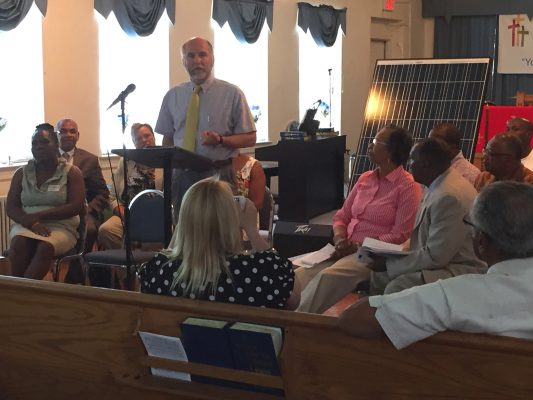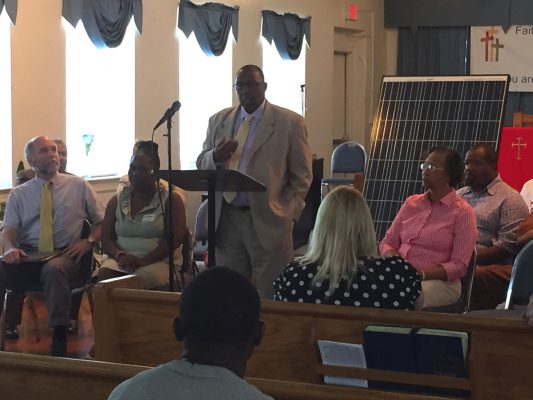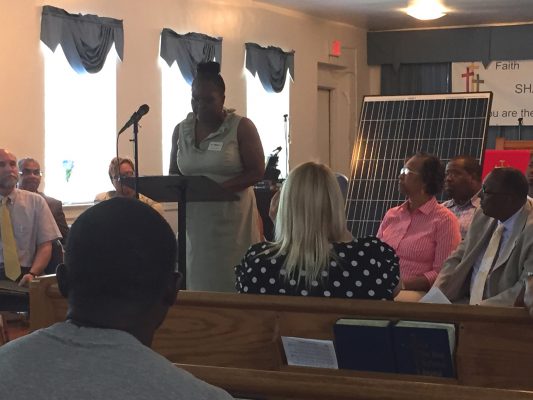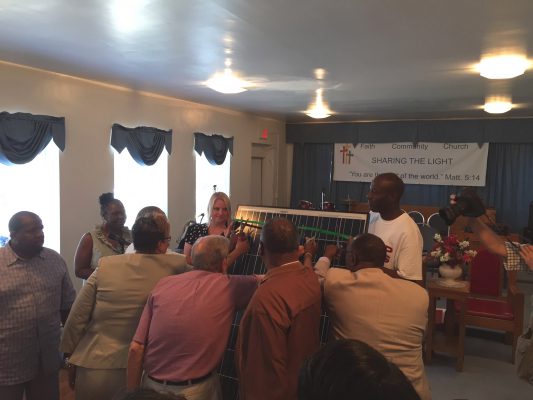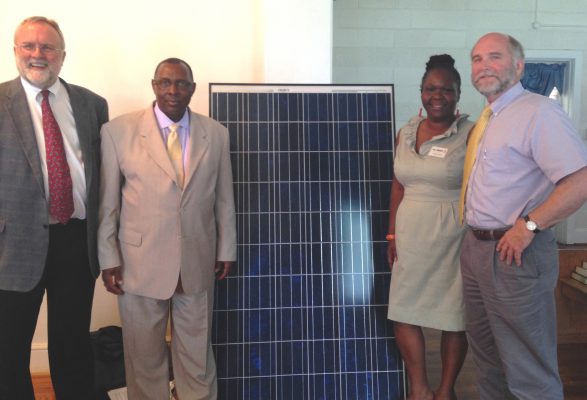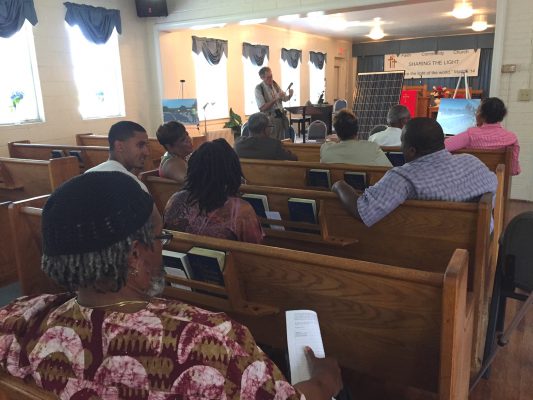Quick Facts:
NC WARN partnered with Faith Community Church in Greensboro on an unprecedented test case that challenged Duke Energy’s blockade against competition from companies that install solar systems on rooftops with little or no upfront cost to the customer.
This kind of “third-party sales” is legal in most other states, making solar power affordable for a much broader range of customers. (Read about the 2015 Energy Freedom bill that would have expressly permitted third-party sales in NC, but was blocked by Duke Energy.)
In June 2015, NC WARN installed solar panels on the church roof and the church began buying the solar power from NC WARN at a price far lower than what it pays on its monthly bill to Duke Energy.
The sale of power was suspended after the NC Utilities Commission ruled that the project was unlawful. NC WARN appealed the case to the NC Court of Appeals, which ruled for the Utilities Commission on a 2-1 vote. NC WARN then appealed the case to the NC Supreme Court, supported by national groups including Center for Biological Diversity, Greenpeace, Friends of the Earth and Institute for Local Self-Reliance. The Supreme Court ruled against us in May 2018. Read more below.
The project was featured in Jonathan Scott’s 2020 documentary Power Trip and again on John Oliver’s Last Week Tonight in 2022.
A local filmmaker produced a short documentary on NC WARN’s partnership with Faith Community Church in our Emergency Climate Response and Solar Freedom campaigns. Click to watch the video.
Media coverage
Ben & Jerry’s wrote about Solar Freedom on their website and came to an NC WARN event in Pittsboro
More media coverage
Timeline
June 2015: NC WARN installs solar on Faith Community Church, asks NC Utilities Commission for declaratory ruling
News release
NC WARN request for declaratory ruling
Ribbon-cutting video, photos and media coverage
November 2015: Duke Energy seeks $120,000 sanction against NC WARN in Solar Freedom case. News release
April 2016: NC Utilities Commission rules for Duke Energy and levies a fine against NC WARN of approximately $60,000. News release
All NCUC filings in this docket
May 2016: NC WARN files notice that it will appeal Utilities Commission ruling. News release
October 2016: NC WARN files appeal of Utilities Commission ruling at NC Court of Appeals.
Read filing
Read Friend of the Court brief filed by several NC faith-based organizations
February 2017: NC Court of Appeals hears oral arguments
September 2017: NC Court of Appeals rules 2-1 against NC WARN
Read ruling here (don’t miss Judge Dillon’s eloquent dissent)
NC WARN news release
Greensboro News & Record editorial
October 2017: NC WARN announces appeal to the NC Supreme Court
NC WARN news release
November 2017: NC WARN submits appeal to NC Supreme Court
NC WARN news release
NC WARN brief to NC Supreme Court
Amicus brief by Center for Biological Diversity et al.
April 17, 2018: NC Supreme Court hears case in Raleigh, NC.
May 11, 2018: NC Supreme Court rules against NC WARN.
NC WARN statement
Associated Press article in Greensboro News & Record
Solar Test Case Targets State Policy in North Carolina
Church, climate justice partner announce third party deal, saying state needs energy competition, not monopoly control of rooftops
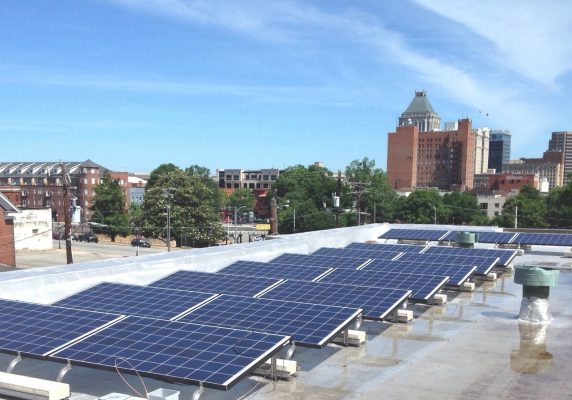 June 17, 2015
June 17, 2015
GREENSBORO, NC – An African-American church now has 5.2 kilowatts of solar power on its roof via a system installed and owned by ally nonprofit NC WARN. In a partnership that could impact state policy at a critical time, the church will buy the solar power from NC WARN at a price far lower than what it pays on its monthly bill to Duke Energy.
The Solar Freedom project was announced today at a ribbon-cutting ceremony hosted by Rev. Nelson Johnson, pastor of Faith Community Church in downtown Greensboro. The unprecedented project was accompanied by an NC WARN legal filing seeking a declaratory ruling by the NC Utilities Commission in a case where the nonprofits argue such third party sales are not prohibited by state law.
Rev. Johnson said today, “We are happy to engage in this partnership that can help leverage solar power’s savings and jobs to more communities – while reducing the effects of Duke Energy’s monopoly control that has such negative impacts on power bills, clean air and water, and climate change.”
Today’s ceremony was attended by other clergy interested in gaining access to third party – or “no money down” – solar power financing in order to save money and further their Earth stewardship. Third party financing is the subject of a bipartisan bill in the General Assembly that has broad public, business and military support, but which has stalled as Duke Energy lobbies vigorously to block it.
North Carolina is one of only four states where third party sales is thought to be disallowed. Georgia recently became the latest state where either regulators or courts have allowed solar companies to sell power directly to customers from systems on those customers’ property.
Iowa’s Supreme Court last year said “yes” to third party sales in a rebuke to state regulators and monopoly utilities. In its filing today, NC WARN also cites precedents from two in-state cases. The nonprofit partners argue their funding arrangement is consistent with state energy policy, with the constitutional ban of monopolies, and that it should be encouraged across North Carolina.
“Third party financing is an open question in North Carolina,” NC WARN community organizer Ravin St. Julien-Brown said today. “Hopefully the General Assembly will clarify it before the regulators do. Third party solar could be helping all electricity customers avoid rate hikes for more power plants – if companies offering third party sales are allowed to compete in this state.”
The rooftop system at Faith Church should begin generating electricity in July, pending final permits. Any excess power will be fed to the grid and credited against the church’s Duke Energy bill.
This spring Rev. Johnson and NC WARN director Jim Warren co-authored a letter calling for Duke CEO Lynn Good to stop targeting African-American leaders with a “solar hurts the poor” message. The pair cited a national campaign by the Koch Brothers and monopoly utilities – detailed in a March 7 expose by the Washington Post – that’s intended to stamp out the growing use of rooftop solar.
Rev. Johnson added today: “The time is right for the People of North Carolina to come together around our common goals of stewardship, pollution, and the protection of low-income customers against the rising power bills they face under Duke Energy’s current plans.”
NC WARN’s legal filing with the NC Utilities Commission (June 2015)
Filing with the NC Court of Appeals (October 2016)
Greensboro African American Clergy Support Solar Policies
Read about the Energy Freedom Act, which would have allowed 3rd-party sales in NC
Media Coverage on Launch of Solar Freedom Project
A Church Challenges Duke Energy Over Solar — WUNC Radio, August 21, 2015
Challenge of NC law aims to open solar markets — Charlotte Observer
N.C. Church Takes a Defiant Stand—With Solar Panels — InsideClimate News
Red tape preventing Greensboro church from getting solar energy — News & Record
Duke Energy: Group’s plan to sell solar power to a Greensboro church is ‘unlawful’ — Charlotte Business Journal
Freedom Act would allow third-party sales of solar power in N.C. — News & Record
Greensboro church installs solar panels, challenges Duke on selling electricity (VIDEO) — News & Record
NC WARN sets up test case on solar-power sales — Charlotte Business Journal
NC WARN seeks legal right to sell solar power to Greensboro church — News & Observer
Group Hopes To Provide Solar Power To Greensboro Church — WFDD
NC appeals court rules against NC WARN in Greensboro solar power case — NC Policy Watch
Our Opinion: A public utility?— News & Record
Editorial: NC WARN is right in its solar power lawsuit against Duke Energy— NC Policy Watch
Photos from the 5.2-kW rooftop solar installation
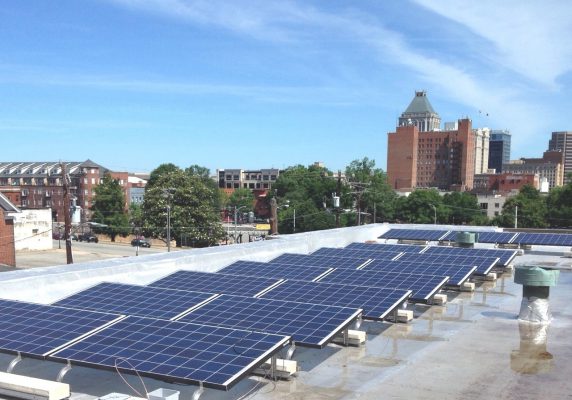
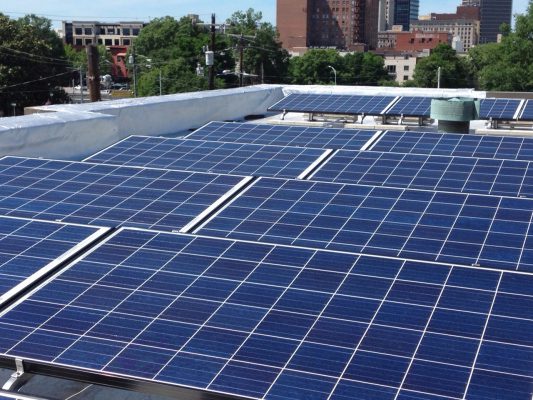
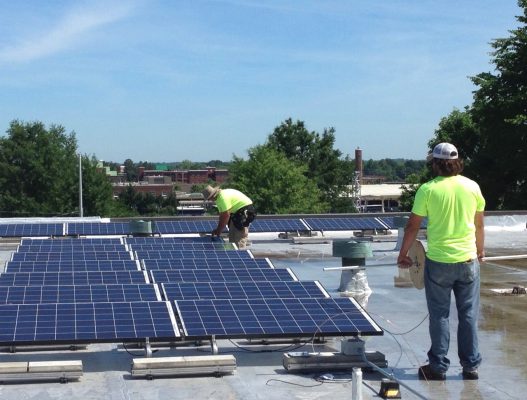
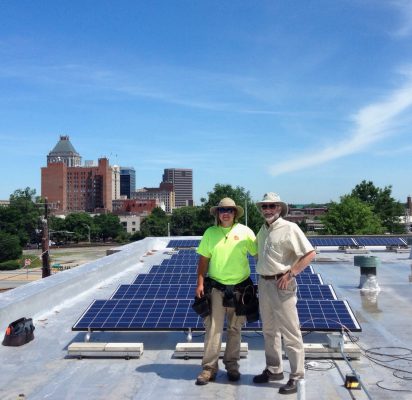
Recent News
How smaller congregations are challenging the system to ‘go solar’ — Religion News Service
Faith Community Church, a small, mostly African-American congregation, has a long history of activism dating back to the civil rights era. About a decade ago, church members, who worship in a small space within the Beloved Community Center, a larger hub for social justice activism, began to recognize the growing urgency of climate change, as well.
SEE ALL Solar Freedom in Greensboro POSTSHow Solar Panels on a Church Rooftop Broke the Law in N.C. — Inside Climate News
An environmental group and a largely African-American church tried to challenge North Carolina’s utility monopoly by generating cheap, clean power. They lost.
SEE ALL Solar Freedom in Greensboro POSTS